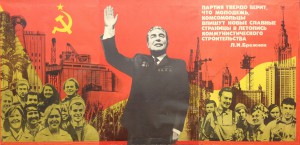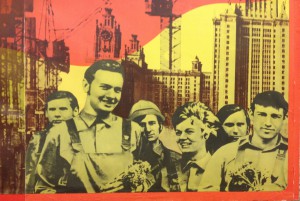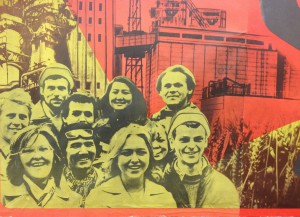As the Slavic Librarian and the Cataloger, I get to spend one day each week in Special Collections, mostly cataloging Slavic materials in the de Saint-Rat collection, occasionally helping with other materials or tending the desk. I enjoy and am honored to be included in the daily life of this truly special department and like to think of it as the third part of my job. I love all parts of my job, but Thursdays are a highlight of my week. Special things almost always happen on Thursdays. Whether discovering an inscription that gives you goose bumps and launches a month-long research project or just being in the company of the most amiable people in the library, every Thursday is unfailingly special.
When I got there this Thursday, two surprises were already waiting for me. One was my very own name tag on one of the windows of the Reading room, making me feel official and appreciated. The other was a “present” that Jim Bricker thoughtfully left behind my chair, a flat package, cocooned in plastic and standing taller than me. Neither one of us knew what it was beyond its label: “Brezhnev poster.” Thinking that I may need some time to prepare mentally to see Brezhnev this big, I left it looming over my head while I was settling in. When we finally opened it, we discovered an instant collection gem. Measuring a little over 3’x6.5’, it is the largest, brightest, and the most imposing of our posters. It is the only one from that time period.
The poster was published in 1979, the fifteenth year of Brezhnev’s post as the General Secretary of the Soviet Union. Leonid Il’ich Brezhnev enjoyed an 18-year term, second longest (after Stalin’s) and, by some accounts, the most popular as the General Secretary. In the best traditions of Soviet leaders he nurtured his own “cult of personality,” a divinization of sorts, though not nearly as successfully as Stalin or Lenin. After being instrumental in removing his mentor Nikita Khrushchev from power in 1964, he was surprisingly passive in his decision-making regarding most aspects, especially the economy, consulting colleagues before making any decisions. Instead, he put all his efforts into developing the military. As a result, his term is popularly known as the Era of Stagnation, while his major accomplishment closer to the end was sending the Soviet troops to Afghanistan.
His term finished with his death in 1982, which was not reported immediately. The Soviet television stations built up to the announcement by changing the scheduled programming to broadcasts of revolutionary documentaries and classical music concerts, rather than hockey games and pop music performances. This lasted for a day or two until the formal announcement was made. A week after I remember being pulled from class in first grade, along with the rest of the school to watch the funeral on the only television set in the director’s office. I remember the close up of the casket with Brezhnev in it, which made several teachers sob loudly. Brezhnev suffered from a multitude of illnesses, including cancer, leukemia, emphysema, which was not public knowledge. His manner of speaking, as well as his passive approach, was made fun of the most in political jokes and impersonations. In those he was perceived as slow and dumb.
 It’s interesting that in the poster, as huge and imposing as it is, he appears lacking most of his famous medals and distinctions and eyebrows. The two of his most famous attributes are not included, making him look younger and more egalitarian, especially given the relatively little space he is taking up. Before we unwrapped the poster, both Jim and I expected to see a life size portrait (with eyebrows and medals, of course), but found him sharing the large space with two groups of Soviet youth and some factories. The quote loosely translates: “The Party firmly believes that the youth, Komsomol, will write new pages into the chronicle of the communism building.” Another interesting thing about the poster is that it is not the only large format poster using this quote from one of Brezhnev’s speeches. In fact, a better-known poster depicts a young welder in the center instead of Brezhnev and has factories and the quote taking up the rest of the space.
It’s interesting that in the poster, as huge and imposing as it is, he appears lacking most of his famous medals and distinctions and eyebrows. The two of his most famous attributes are not included, making him look younger and more egalitarian, especially given the relatively little space he is taking up. Before we unwrapped the poster, both Jim and I expected to see a life size portrait (with eyebrows and medals, of course), but found him sharing the large space with two groups of Soviet youth and some factories. The quote loosely translates: “The Party firmly believes that the youth, Komsomol, will write new pages into the chronicle of the communism building.” Another interesting thing about the poster is that it is not the only large format poster using this quote from one of Brezhnev’s speeches. In fact, a better-known poster depicts a young welder in the center instead of Brezhnev and has factories and the quote taking up the rest of the space.
The potential for research of the poster is very exciting. If you are the scholar for the job, I will be happy to pull it out for viewing any day of the week and help with resources in any way I can!
Masha Stepanova
Slavic Librarian
